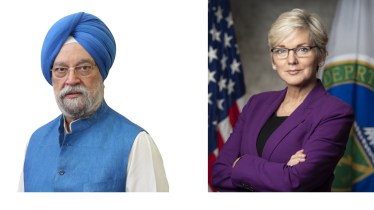A ministerial meeting of the United States-India Strategic Clean Energy Partnership (SCEP) was held between the Indian Minister of Petroleum and Natural Gas, Hardeep S. Puri and U.S. Energy Secretary Jennifer Granholm in New Delhi.
During the meeting, the sides noted the growing importance of bilateral energy cooperation between the countries while underscoring the critical importance of bilateral clean energy engagement and the achievements of the SCEP in strengthening energy security, creating opportunities for clean energy innovation, addressing climate change and creating employment generation opportunities.
The countries have renewed their commitment to work towards a just, orderly and sustainable energy transition, which prioritises access to reliable, affordable, and clean energy supply. The SCEP mandate over the years has deepened and strengthened collaboration across a wide breadth of clean energy work streams, including clean and renewable energy, energy efficiency, increased collaboration in emerging technologies like battery storage and swapping technologies, gas hydrates, advanced biofuels, and hydrogen and electrolyser production.
In this context, the partners have recognised the importance of producing green/clean hydrogen as a critical energy source for global decarbonisation and agreed to support each other’s national hydrogen missions.
Focus on renewable energy
The sides also welcomed the work done by the 5 pillars of the SCEP towards deepening the cooperation between the Public and Private sectors to support decarbonisation in both countries, including through public-private task forces, reverse trade missions, India-US Business Roundtables chaired by the Ministers, and other commercial dialogues.
They emphasised the importance of promoting energy access, affordability and energy justice in each country. It was also acknowledged that successfully achieving ambitious climate and clean energy aspirations necessitates coordinated efforts on development of energy transition roadmaps, capacity building, job skilling, and sharing of best practices at all levels of government. In that context, they have agreed to work toward development of net zero villages in India to support the clean energy transition.
The Ministers have welcomed establishment of the public-private Energy Storage Task Force and related efforts to support large-scale integration of renewable energy needed to support the clean energy transition; deepened collaboration to scale and accelerate deployment of hydrogen technologies through the public-private Hydrogen Task Force and other efforts in support of their national hydrogen strategies, including a focus on common cost reduction goals.
The launch of the U.S.-India New and Emerging Renewable Energy Technologies Action Platform (RETAP) to accelerate development of key technologies to advance common ambitious clean energy goals was also discussed.
The Ministers also welcomed the leaders’ priority of reducing carbon emissions in the transportation sector through zero emissions vehicles and continued collaboration on securing funding and enabling affordable and accessible debt and equity financing for the e-mobility sector. The sides recognised the importance of the ‘Electric Vehicle (EV) financing services facility’ which will create dedicated funds for e-mobility.
Both India and the United States will work towards advancing research, development and commercialisation of technologies in the emerging fuels arena, including bio-ethanol, renewable diesel, sustainable aviation fuels, and other advanced biofuels as a unique and valued asset to the transition to a cleaner energy future.
Five pillars of SCEP
The Ministers affirmed the vision of Prime Minister Narendra Modi and President Joe Biden for establishing the Global Biofuels Alliance which is set to be launched this week in Goa. The Global Biofuels Alliance will play in strengthening markets, facilitating global biofuels trade, development of concrete policy lesson-sharing and provision of technical support for national biofuels programs worldwide.
Agencies from across the U.S. and Indian governments demonstrated a number of accomplishments across the five technical pillars of cooperation on: 1) Power & Energy Efficiency, 2) Renewable Energy, 3) Responsible Oil & Gas, 4) Sustainable Growth, and 5) Emerging Fuels and Technologies.
The Ministers affirmed that the SCEP represents a comprehensive vision to decarbonise while ensuring healthy rates of growth for both countries and expressed hope that the work undertaken under the SCEP will continue to pave the way for a new and promising future.
